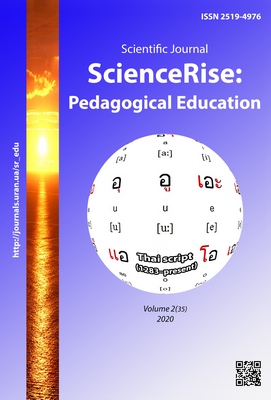Linguo-didactic aspect of formation of the professionally-oriented lexical competence of students of the specialty “Jurisprudence”
DOI:
https://doi.org/10.15587/2519-4984.2020.195947Keywords:
lexical skills, professionally-oriented lexical competence, foreign language vocabulary, education for lifeAbstract
The article notes that the generated lexical competence involves the mastery of the students with the values of a lexical unit, its spelling and pronunciation, knowledge of the grammatical forms of a word, synonyms and antonyms and by mastering the rules of compatibility with other lexical units. Exercises are an integral part of the formation and improvement of the professionally-oriented lexical competence. They are used at the stages of forming and developing lexical skills.
The foreign language professionally oriented vocabulary teaching is based on general didactic principles (availability; scientific content; consciousness; activity; systematic character; consistency and durability of mastering of knowledge, abilities and skills; use of visual methods) and methodological principles (stimulating and motivating a positive attitude to learning a foreign language for specific purposes; considering the individual characteristics of students; professional orientation of teaching foreign language vocabulary; taking into account the degree of professional training of students and the conformity of the content of foreign lexical material to needs of their future professional activities); the principle of systemic learning of a professionally-oriented lexical material on the basis of complex non-communicative and conditionally communicative exercises with an interrelated improvement of skills and abilities of reading, speaking and writing professional orientation, as the formation of the professionally oriented lexical competence should be arranged through the set of exercises, in which the basic principles and training content are implemented.
The formation of the professionally-oriented lexical competence has an impact on the improvement and development of the professionally oriented foreign language communicative competence as a whole. The ability to read and understand professionally-oriented literature and carry out professional communication depends on the level of lexical competence formation.
In general, in the context of contemporary education the attention should be focused primarily on the new standards, the idea of which should be based on the competence approach, which includes the formation of general competences and needs of the labor market. To stop the outflow of future or practicing lawyers is possible only due to the quality of higher education, which is constantly growing, and is aimed at the expectations of the labour market, as well as it is pursuing a preemptive tactic. Today it is necessary to conduct the mandatory formation of general competences, readiness for the challenges that may appear in the near future
References
- Ryabtseva, O. M. (2016). Training of professionally oriented reading of engineering students. Perspektivy razvitiya lingvisticheskogo obrazovaniya v sovremennom obrazovatelnom prostranstve. Taganrog: YuFU, 88–94
- Kolesova, T. V. (2011). Formation of lexical skills in the process of teaching reading and listening by means of multimedia technologies. Bulletin of the Chelyabinsk State Pedagogical University, 3 (71 (1)), 71–76.
- Vepreva, T. B. (2011). Teaching foreign vocabulary to students of nonlinguistic specialties. Vestnik of Northern (Arctic) Federal University. Series: Humanities and social Sciences, 4, 126–130.
- Hamdamova, S. A. (2018). Difficulties in the formation of lexical skills in foreign language lessons. The achievements of science and education, 8 (30). Available at: https://cyberleninka.ru/article/n/trudnosti-v-formirovanii-leksicheskih-navykov-na-urokah-inostrannogo-yazyka
- Gryaznova, M. A. (2012). Improvement of foreign language professional communicative competence of health workers in the context of continuing education: on a material of English language. Saint-Petersburg, 286.
- Yashina, E. V. (2014). The problems of teaching legal english to second language students of law at the academic and professional stage. Bulletin of the Saratov State Academy of Law, 5 (100), 233–238.
- Solomko, Z. K. (2018). The receptive lexical competence of professional foreign language communicative competence. Teaching science: realities and prospects, 60, 137–141.
- Caro, K., Mendinueta, N. R. (2017). Lexis, Lexical Competence and Lexical Knowledge: A Review. Journal of Language Teaching and Research, 8 (2), 205–2013. doi: http://doi.org/10.17507/jltr.0802.01
- Din, M., Ghani, M. (2018). Developing Lexical Competence Through Literature: A Study of Intermediate Students of Pakistan. International Journal of English Linguistics, 8 (4), 164–173. doi: http://doi.org/10.5539/ijel.v8n4p164
- Aleksandrov, K. V. (2010). Multimedia complex in teaching foreign language vocabulary: theoretical and practical aspects. Nizhny Novgorod: NGLU, 174.
- Bezborodova, S. A. (2016). Development of professional foreign language lexical competence of students of mountain specialities based on information and communication technologies: PhD thesis. Ekaterinburg, 251.
- Rozental, D. E. et. al. Dictionary of linguistic terms. Available at: https://www.gumer.info/bibliotek_Buks/Linguist/DicTermin/index.php
- Díaz Frías, V. M. (2014). Working with Competences in the ESL/EFL Classroom. MEXTESOL Journal, 38 (2). Available at: https://mextesol.net/journal/index.php?page=journal&id_article=521 Last accessed: 01.12.2019
- Bulycheva, S. F. (2011). Foreign language in the aspect of developmental education. Alians nauk: uchenii – uchenomu.
Downloads
Published
How to Cite
Issue
Section
License
Copyright (c) 2020 Оlga Kosovych, Maryana Sokol

This work is licensed under a Creative Commons Attribution 4.0 International License.
Our journal abides by the Creative Commons CC BY copyright rights and permissions for open access journals.
Authors, who are published in this journal, agree to the following conditions:
1. The authors reserve the right to authorship of the work and pass the first publication right of this work to the journal under the terms of a Creative Commons CC BY, which allows others to freely distribute the published research with the obligatory reference to the authors of the original work and the first publication of the work in this journal.
2. The authors have the right to conclude separate supplement agreements that relate to non-exclusive work distribution in the form in which it has been published by the journal (for example, to upload the work to the online storage of the journal or publish it as part of a monograph), provided that the reference to the first publication of the work in this journal is included.







